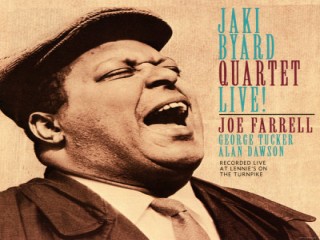
Jaki Byard biography
Date of birth : 1922-06-15
Date of death : 1999-02-11
Birthplace : Worcester, Massachusetts, U.S.
Nationality : American
Category : Famous Figures
Last modified : 2011-10-24
Credited as : jazz pianist, Sam Rivers Band,
0 votes so far
His mother encouraged the boy's interest in music, listening to jazz music on the radio and, when she was able, providing him with opportunities to go and see some of the great jazz musicians when they were playing nearby.
By age 16, Byard had his first professional job as a musician. In 1941 he moved from Worcester to Boston in an attempt to further his career. However, as the United States was entering into World War II, Byard was drafted into the Army. Fortunately, he met other musicians, including drummer Kenny Clarke and piano player Ernie Washington. He decided to join the army band, but since the band already had a piano player, Byard took up the trombone.
He was discharged from the Army in 1945 and returned to Boston, where he studied music on his own, particularly the styles of his two favorite players, Bud Powell and Errol Garner. He quickly began to find work in the Boston area. By the late 1940s, he had worked with tenor saxophonist Sam Rivers in his band, and had worked with violinist and trumpeter Ray Nance in society jobs. In 1949 he joined alto saxophonist Earl Bostic in his band. His talents were in great demand, and he also began teaching others, despite never having had formal training of his own.
In 1955 Byard joined trumpeter Herb Pomeroy's band as a tenor saxophone player. He also began composing and arranging music for the group. After a few years, he returned to solo piano playing. He moved to New York City and recorded his first solo album, Blues for Smoke, in 1960. He also played in the band of trumpet player Maynard Ferguson before finally joining up with jazz composer and bass player Charles Mingus. Mingus had a great influence on Byard, constantly pushing him to try new rhythms and harmonies.
In 1960 Byard played on woodwind master Eric Dolphy's recording, Outward Bound. Dolphy then assisted Byard in a relationship with Prestige Records that resulted in Byard's release of Here's Jaki in 1961. Then he recorded with Mingus on The Complete Town Hall Concert and Mingus, Mingus, Mingus, Mingus, Mingus, as well as The Black Saint and the Sinner Lady. In 1963 he worked and recorded with Booker Irvin, a tenor saxophone player. He also worked with other music greats, including Don Ellis, Charlie Mariano, and Booker Little.
In 1965 he connected with another multi-instrumentalist, Rahsaan Roland Kirk. In 1966 he won the Down Beat Jazz Poll Award for most promising musician of that year. Byard joined the faculty at the New England Conservatory in 1969, after an invitation by its president, Gunther Schuller, to head up the school's jazz teaching. He taught there until 1977, while also teaching classes and lecturing at other schools, including the Manhattan School of Music, Bennington College, Hartford School of Music, Brooklyn Conservatory, University of Massachusetts, Harvard University, University of Pittsburgh, University of Maryland, and Bismark Jr. College. He was asked by Mercer Ellington to sit in for his father, Duke Ellington, when the Duke was ill. He received the Duke Ellington Fellowship Award from Harvard University in 1973.
In the mid-1970s, Byard decided to form a big band from a group of his students. He named it the Apollo Stompers. At one point, he made up two bands from his student groups, with each group sitting on opposite sides of the stage. "I called it the Stereophonic Ensemble," he joked to Royal Stokes, "and the effect was very interesting because I could bring that band down and this band up and you could hear the difference---just like listening to a stereophonic performance. That was one of my dreams." He then decided to put together another band by the same name with a group of musicians he knew in New York.
In 1983 People stated, "As a solo pianist, Byard mixes his styles liberally, not only from song to song but often within songs." In 1986 People again reviewed his work, this time evaluating Rhythm is Our Business, which he recorded with Jordan Sandke. "Crossing generational and stylistic lines with gleeful disregard, this album is an engaging bit of chamber jazz," the article stated. "The group wanders happily from New Orleans style to swing to bop." In 1995 Mayor Rudolph Giuliani presented him with an award during the 100th anniversary of Harlem Week, for his work with the Apollo Stompers.
Tragically, in a strange, unsolved mystery, Byard was found dead, killed by a gunshot wound to the head on February 11, 1999, in his home in Queens, New York. Though his daughters were also in residence at the time of the crime, no one heard any disturbance, and the home had no signs of forced entry, burglary, or even a struggle. Byard's wife, Louise, had passed away previously in 1994, but he left behind three children, Denise, Diane, and Gerald, as well as four grandsons and six great grandsons.
Byard's influence on the music world was that of a true musician. Throughout his lifetime he mastered the piano, trumpet, trombone, bass, vibes, drums, and saxophone. He was a lifelong student who continued to learn about music, even while he taught others.
















